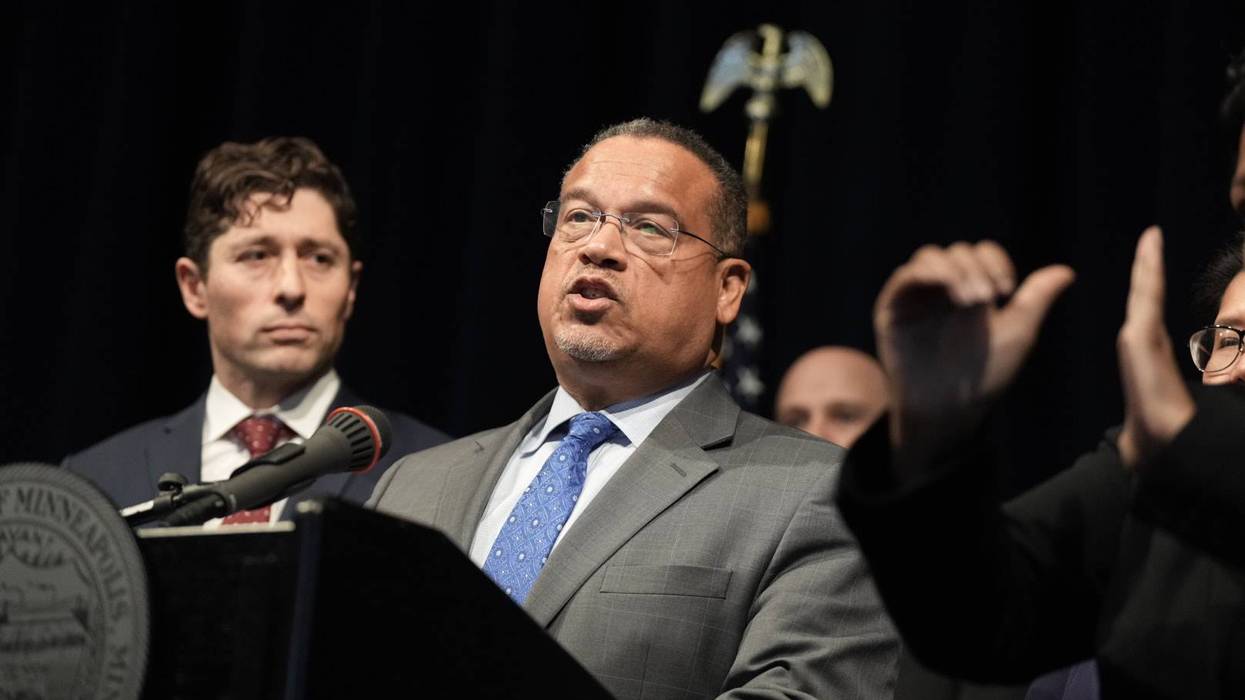Amid the mounting violence by federal agents in Minnesota and the Trump administration's related propaganda—which have fueled protests across the country—the state's Democratic attorney general, Keith Ellison, plus the cities of Minneapolis and Saint Paul, took aim at DHS, CBP, ICE, and various agency leaders in a US district court.
"Defendants claim this unprecedented surge of immigration agents is necessary to fight fraud," says the complaint, filed in the District of Minnesota. "In reality, the massive deployment of armed agents to Minnesota bears no connection to that stated objective and instead reflects an alarming escalation of the Trump administration's retaliatory actions towards the state."
In a Monday statement, Ellison stressed that "the unlawful deployment of thousands of armed, masked, and poorly trained federal agents is hurting Minnesota."
"People are being racially profiled, harassed, terrorized, and assaulted," he noted. "Schools have gone into lockdown. Businesses have been forced to close. Minnesota police are spending countless hours dealing with the chaos ICE is causing. This federal invasion of the Twin Cities has to stop, so today I am suing DHS to bring it to an end."
As footage of an ICE officer shooting Good began to circulate online last week, Democratic Minneapolis Mayor Jacob Frey publicly told the agency to "get the fuck out" of his city. On Monday, he added that "when federal actions undermine public safety, harm our neighbors, and violate constitutional rights, we have a responsibility to act. That's exactly what we’re doing today."
Trump's "Operation Metro Surge" in Minnesota this year followed the September launch of "Operation Midway Blitz" in Illinois, which targeted Chicago and its suburbs—where immigration agents have also shot multiple people in recent months, including one fatally.
"Border Patrol agents and ICE officers have acted as occupiers rather than officers of the law," Democratic Illinois Attorney General Kwame Raoul declared Monday. "They randomly, and often violently, question residents. Without warrants or probable cause, they brutally detain citizens and noncitizens alike."
"They use tear gas and other chemical weapons against bystanders, injuring dozens, including children, the elderly, and local police officers," he continued. "I filed this lawsuit to stand up for the safety of the people of Illinois and the sovereignty of our state."
The 103-page suit, filed in the Northern District of Illinois, followed another from the state and city of Chicago that blocked Trump's attempt to deploy the National Guard in the area, as he had done in Los Angeles, California and Washington, DC. At the end of last month, the president announced troops would leave Chicago, LA, and Portland, Oregon, but also said that "we will come back."
Democratic Illinois Gov. JB Pritzker—a frequent critic of the president—said Monday that "Illinois is once again taking Donald Trump to court to hold his administration accountable for their unlawful tactics, unnecessary escalations, and flagrant abuses of power."
Chicago Mayor Brandon Johnson emphasized that "these actions weren't just unlawful; they were cruel, needlessly inflicting fear and harm on our communities."
"My administration will forcefully protect our residents' rights and hold anyone accountable who abuses their power," Johnson pledged. "Nobody is above the law. This lawsuit is about ensuring there is accountability for the lawless actions of the Trump administration and justice for the Chicagoans who have been wronged."
In statements to multiple media outlets, DHS spokesperson Tricia McLaughlin made clear that the Trump administration plans to fight back against both states' moves. She called the Illinois filing "a baseless lawsuit," and said of the Minnesota case, "We have the Constitution on our side on this, and we look forward to proving that in court."
Meanwhile, critics of the Trump administration, and particularly its immigration operations, welcomed the new suits.
Congresswoman Delia Ramirez (D-Ill.), a daughter of immigrants, wrote in a social media post about the suit in her state that "DHS's terror force is the greatest threat to our safety. Their militarized invasion of our cities puts us all at risk. They need to be defunded. They need to be held accountable. In the streets, in Congress, and in courts, we will fight to protect our communities, and we will win."




